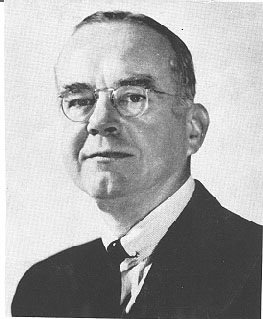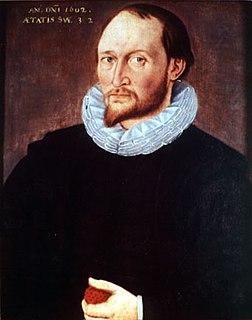
George Farquhar was an Irish dramatist. He is noted for his contributions to late Restoration comedy, particularly for his plays The Constant Couple (1699), The Recruiting Officer (1706) and The Beaux' Stratagem (1707).

Stephen Jay Greenblatt is an American Shakespearean, literary historian, and author. He has served as the John Cogan University Professor of the Humanities at Harvard University since 2000. Greenblatt is the general editor of The Norton Shakespeare (2015) and the general editor and a contributor to The Norton Anthology of English Literature.

James Burnham was an American philosopher and political theorist. He chaired the philosophy department at New York University; His first book was An Introduction to Philosophical Analysis (1931). Burnham became a prominent Trotskyist activist in the 1930s. He later rejected Marxism and became an even more influential theorist of the right as a leader of the American conservative movement. His book The Managerial Revolution, published in 1941, speculated on the future of capitalism. Burnham was an editor and a regular contributor to William F. Buckley's conservative magazine National Review on a variety of topics. He rejected containment of the Soviet Union and called for the rollback of communism worldwide.

Thomas Harriot, also spelled Harriott, Hariot or Heriot, was an English astronomer, mathematician, ethnographer and translator to whom the theory of refraction is attributed. Thomas Harriot was also recognized for his contributions in navigational techniques, working closely with John White to create advanced maps for navigation. While Harriot worked extensively on numerous papers on the subjects of astronomy, mathematics and navigation, he remains obscure because he published little of it, namely only The Briefe and True Report of the New Found Land of Virginia (1588). This book includes descriptions of English settlements and financial issues in Virginia at the time. He is sometimes credited with the introduction of the potato to the British Isles. Harriot was the first person to make a drawing of the Moon through a telescope, on 5 August 1609, about four months before Galileo Galilei.

The Essays of Michel de Montaigne are contained in three books and 107 chapters of varying length. They were originally written in Middle French and were originally published in the Kingdom of France. Montaigne's stated design in writing, publishing and revising the Essays over the period from approximately 1570 to 1592 was to record "some traits of my character and of my humours." The Essays were first published in 1580 and cover a wide range of topics.
Subversion refers to a process by which the values and principles of a system in place are contradicted or reversed in an attempt to transform the established social order and its structures of power, authority, hierarchy, and social norms. Subversion can be described as an attack on the public morale and, "the will to resist intervention are the products of combined political and social or class loyalties which are usually attached to national symbols. Following penetration, and parallel with the forced disintegration of political and social institutions of the state, these tendencies may be detached and transferred to the political or ideological cause of the aggressor". Subversion is used as a tool to achieve political goals because it generally carries less risk, cost, and difficulty as opposed to open belligerency. Furthermore, it is a relatively cheap form of warfare that does not require large amounts of training. A subversive is something or someone carrying the potential for some degree of subversion. In this context, a "subversive" is sometimes called a "traitor" with respect to the government in power.
Jonathan G Dollimore is a British philosopher and critic in the fields of Renaissance literature, gender studies, queer theory, history of ideas, death studies, decadence, and cultural theory. He is the author of four academic books, a memoir, and numerous academic articles. With Alan Sinfield he was the co-editor of and key contributor to Political Shakespeare, and the co-originator of the critical practice known as cultural materialism. Dollimore is credited with making major interventions in debates on sexuality and desire, Renaissance literary culture, art and censorship, and cultural theory.
A Christian republic is a government that is both Christian and republican. As of the 21st century, the only countries in the world with a republican form of government and with Christianity as the established religion are Argentina, Costa Rica, Finland, Greece, Armenia, Samoa, Iceland, and Malta. Some other republics, such as Georgia, Peru, Guatemala, Panama, El Salvador, and Paraguay, give some credit or preference to Christianity, but without establishing it as the religion of the state. Others, such as Hungary, and Zambia, describe themselves as Christian countries.

In postcolonial studies and in critical theory, the term subaltern designates and identifies the colonial populations who are socially, politically, and geographically excluded from the hierarchy of power of an imperial colony and from the metropolitan homeland of an empire. Antonio Gramsci coined the term subaltern to identify the cultural hegemony that excludes and displaces specific people and social groups from the socio-economic institutions of society, in order to deny their agency and voices in colonial politics. The terms subaltern and subaltern studies entered the vocabulary of post-colonial studies through the works of the Subaltern Studies Group of historians who explored the political-actor role of the men and women who constitute the mass population, rather than re-explore the political-actor roles of the social and economic elites in the history of India.

Our Country's Good is a 1988 play written by British playwright Timberlake Wertenbaker, adapted from the Thomas Keneally novel The Playmaker. The story concerns a group of Royal Marines and convicts in a penal colony in New South Wales, in the 1780s, who put on a production of The Recruiting Officer.
Maxwell Robert Guthrie Stewart "Max" Stafford-Clark is a British theatre director.
Out of Joint is a British and international touring theatre company based in London. It specialises in the commissioning and production of new writing, interspersed with occasional revivals and classic productions.
Gregory Melleuish is an Australian associate professor of history and politics at the University of Wollongong. Subjects he teaches include Australian politics, political theory, world history and ancient history. Previously, he taught European history at the University of Melbourne and Australian Studies at the University of Queensland. He occasionally contributes opinion pieces for The Australian, The Conversation and On Line Opinion.

Aizawa Seishisai, born Aizawa Yasushi, was a Japanese samurai and a nationalist thinker of the Mito school during the late shogunate period.

Manteo was a Croatan Native American, and was a member of the local tribe that befriended the English explorers who landed at Roanoke Island in 1584. Though many stories claim he was a chief, it is understood that his mother was actually the principal leader of the tribe. This leadership would not have automatically passed down to her children as many English at the time may have assumed.
Articles in social and political philosophy include:
Christian privilege is a social advantage that is bestowed upon Christians in any historically Christian society. This arises out of the presumption that Christian belief is a social norm, that leads to the marginalization of the nonreligious and members of other religions through institutional religious discrimination or religious persecution. Christian privilege can also lead to the neglect of outsiders' cultural heritage and religious practices.
Christianity and colonialism are often closely associated with each other due to the service of Christianity, in its various sects, as the state religion of the historical European colonial powers, in which Christians likewise made up the majority. Through a variety of methods, Christian missionaries acted as the "religious arms" of the imperialist powers of Europe. According to Edward Andrews, Christian missionaries were initially portrayed as "visible saints, exemplars of ideal piety in a sea of persistent savagery". However, by the time the colonial era drew to a close in the later half of the 20th century, missionaries became viewed as "ideological shock troops for colonial invasion whose zealotry blinded them", colonialism's "agent, scribe and moral alibi".
New historicism, a form of literary theory which aims to understand intellectual history through literature and literature through its cultural context, follows the 1950s field of history of ideas and refers to itself as a form of cultural poetics. It first developed in the 1980s, primarily through the work of the critic Stephen Greenblatt, and gained widespread influence in the 1990s. Greenblatt coined the term new historicism when he "collected a bunch of essays and then, out of a kind of desperation to get the introduction done, he wrote that the essays represented something called a 'new historicism'".
Matthew Jocelyn is the former artistic and general director of Canadian Stage, the largest not-for-profit theatre in Toronto, Ontario, Canada. Prior to his appointment at Canadian Stage, Jocelyn was the artistic and general director of the Atelier du Rhin in Alsace, France for 10 years. Under his leadership, the organization became a major centre for multidisciplinary arts in France. He was named Chevalier des Art et des Lettres, by the French Ministry of Culture in July 2008.








